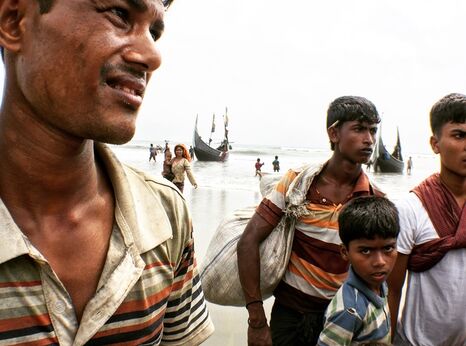Rohingya refugees detained on remote island

Nearly one million Rohingya, a persecuted mostly Muslim minority in Myanmar, have fled waves of violent attacks in the country since 1978 and sought refuge in neighbouring Bangladesh. The overwhelming majority of them began arriving three years ago, starting on 25 August 2017, when more than 740,000 Rohingyas fled Myanmar, after their homes were burned, and at least 10,000 Rohingya men, women and children were killed in the Myanmar military’s crimes against humanity.
The Bhashan Char, which in English translates to “floating island”, was developed by the Bangladesh Navy and emerged from silt in the Bay of Bengal about 20 years ago. “Its dense mat of cellular housing blocks, encircling embankment and the ocean do not suggest infrastructure conducive to civilian life, but rather the kinds of infrastructure associated with incarceration,” wrote Lindsay Bremner, a professor of architecture at the University of Westminster, in an article titled “Sedimentary logics and the Rohingya refugee camps in Bangladesh”, published in the ScienceDirect in March 2020.
In September 2020, Amnesty International released the briefing “Let Us Speak for our Rights”, where two Rohingya refugees said that they heard accounts of sexual harassment at the hands of police and Navy officials on the island. Instead of commissioning prompt and impartial investigation into the allegations, the authorities vehemently refused.
Two weeks prior to the relocation in December 2020, five family members, who represent 23 Rohingya refugees, told Amnesty International that they signed up to relocate to Bhashan Char out of compulsion rather than a choice.
A Rohingya woman on the list for relocation told Amnesty International that she registered to go to the island because her husband is there. As a single parent, with a young child and without any relatives in the camp, she has been facing many problems. “It’s very difficult to live this refugee life. I don’t have any other option. It seems that the government will never allow my husband to get out of the island,” she said.
Two Rohingya families were put on the list for relocation after they reported partial damage of their shelters to government officials and the majhi - a Rohingya community leader selected by Bangladeshi authorities. Instead of having their shelters repaired, they were told that they must relocate to Bhashan Char.
Humanitarian staff in the healthcare sector have expressed grave concerns about the relocation. A Rohingya patient of expressed “complete panic” ahead of the relocation, saying he was being forced to go to Bhashan Char. “He doesn't know whether he's going to continue to receive medications there and wanted to collect a few months’ worth,” said of the staff members.
Staff of the prominent healthcare facility told Amnesty International that some of these refugees are on regular medications. As It is unknown whether health care will be made available on the Bhashan Char, there is grave concern their health could destabilize.
Article 9 of the International Covenant on Civil and Political Rights (ICCPR), to which Bangladesh is a state party, guarantees everyone the right to liberty and prohibits arbitrary detention and deprivation of liberty except with procedures established by law. Article 12 of the ICCPR guarantees everyone within a territory of a state the right to liberty of movement and freedom to choose their residence.